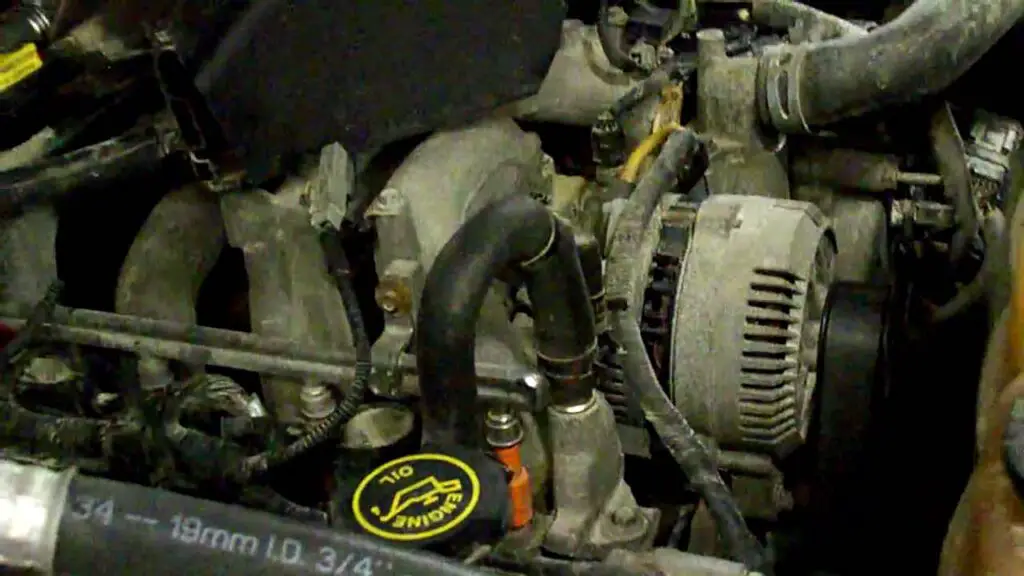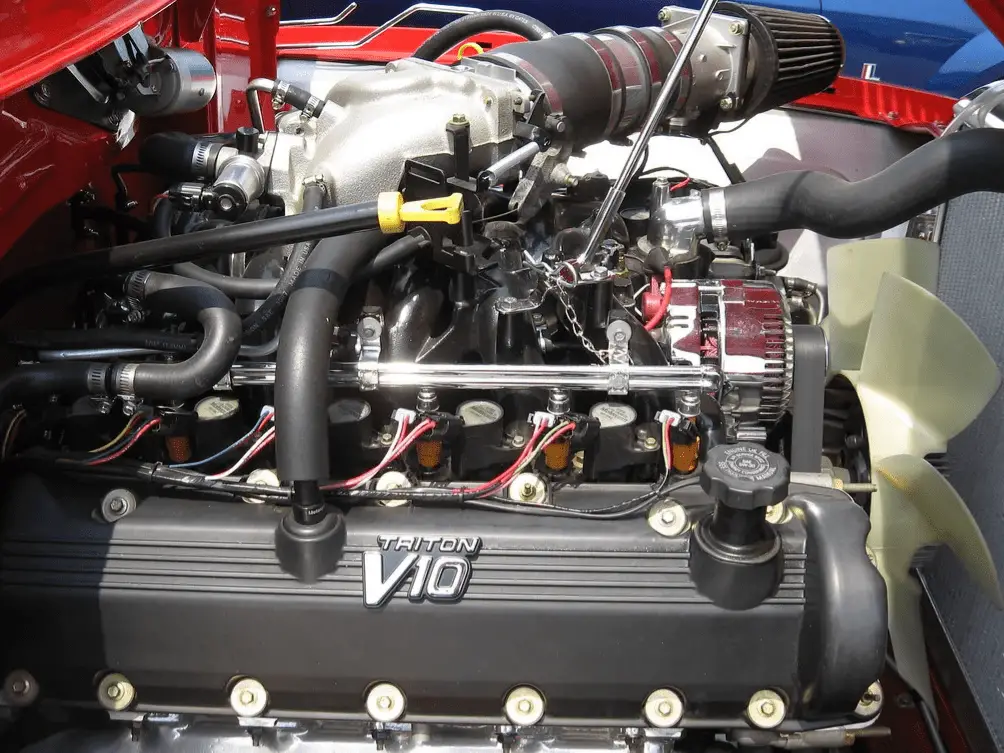Ford V10 engine problems include issues such as spark plug blowouts, exhaust manifold leaks, and intake manifold cracks, especially in models produced before 2002.
The Ford V10 engine, particularly the 6.8L Triton V10, has been one of Ford’s most used powertrains in its heavy-duty lineup, powering a range of vehicles such as the Ford F-Series Super Duty trucks, E-Series vans, and RVs. This engine is well-regarded for its towing capability and reliability. However, like any engine, the Ford V10 has its share of common issues that owners should be aware of.
In this article, we’ll explore the most frequent problems with the Ford V10 engine, how to identify them, and what steps can be taken to address them.

Contents
Ford V10 Engine
The Ford V10 engine is part of Ford’s modular engine family, introduced in the late 1990s. It quickly became a popular choice for larger trucks and commercial vehicles due to its impressive torque and horsepower output. The 6.8L V10 was designed for applications requiring significant towing capacity, with its 10 cylinders providing ample power for demanding tasks.
Despite its robustness, the Ford V10 has faced several issues that have garnered attention over the years. Knowing these issues can help vehicle owners maintain their engines properly and avoid costly repairs. In this article, we’ll delve into the key problems that Ford V10 engine owners face and how to address them.
Common Ford V10 Engine Problems
While the Ford V10 engine is known for its power and reliability, it is not immune to certain issues that can affect its performance. Knowing these common problems can help owners diagnose and address issues early, ensuring their engine runs smoothly for longer.
1. Spark Plug Blowouts (Pre-2002 Models)
One of the most notorious issues with the early Ford V10 engines is spark plug blowouts, which primarily affected models produced between 1997 and 2002. The issue stemmed from a flaw in the design of the aluminum cylinder heads. The threads that held the spark plugs in place were prone to stripping, leading to the spark plugs ejecting from the engine under high pressure.
Symptoms of Spark Plug Blowout:
- Loss of power and acceleration
- Unusual noises (such as popping or backfiring)
- Engine misfires or rough idle
- Increased fuel consumption
This issue was eventually addressed by Ford through a redesign of the cylinder heads in later models. The newer models feature stronger threads and a more robust design to prevent this problem. However, for owners of older models, replacing the spark plugs regularly and checking the condition of the cylinder heads is essential.
Solutions:
- Prevention: Regularly replacing spark plugs at manufacturer-recommended intervals.
- Fix: If blowouts occur, rethreading or replacing the cylinder head may be necessary, depending on the extent of the damage.
2. Exhaust Manifold Leaks
Exhaust manifold leaks are another common issue with the Ford V10 engine. Over time, the bolts that hold the exhaust manifold in place can loosen, break, or become corroded. This can lead to exhaust leaks, which can impact engine performance and cause unusual engine noises.
Symptoms of Exhaust Manifold Leaks:
- Loud, unusual exhaust noises (especially during acceleration)
- Decreased fuel efficiency
- Engine performance issues, such as sluggishness or rough idle
The exhaust manifold leaks are more common in older models of the Ford V10 engine, but they can occur at any time. The leaks affect the engine’s air-fuel mixture, leading to poor combustion efficiency, which in turn can reduce power and increase emissions.
Solutions:
- Fix: The exhaust manifold gasket should be replaced regularly, and any broken or rusted bolts should be replaced. If the manifold itself is damaged, it may need to be replaced.
3. Intake Manifold Cracks
The intake manifold is another component that can be problematic in some Ford V10 engines. Models produced before 2002 were equipped with nylon composite intake manifolds, which were prone to cracking over time. This can cause coolant leaks, which may lead to engine overheating, misfires, and other issues related to coolant loss.
Symptoms of Intake Manifold Cracks:
- Engine overheating
- Coolant loss without visible leaks
- White smoke from the exhaust (indicating coolant entering the combustion chamber)
- Misfires or poor engine performance
Ford issued a recall for certain vehicles affected by this intake manifold issue. If your vehicle is impacted, it may have already had the intake manifold replaced under this recall. However, if you own a pre-2002 model, it’s essential to monitor the manifold’s condition.
Solutions:
- Fix: If the intake manifold cracks, it should be replaced with an upgraded aluminum manifold. This upgrade significantly improves the durability and performance of the engine.
4. Head Gasket Failures
Head gasket failure is a common issue in many engines, including the Ford V10. The head gasket seals the cylinder head to the engine block and prevents coolant and oil from mixing. When the head gasket fails, it can lead to coolant leaking into the combustion chamber, causing the engine to overheat or misfire.
Symptoms of Head Gasket Failure:
- White smoke from the exhaust
- Loss of coolant with no visible leaks
- Overheating engine
- Bubbling in the radiator or coolant reservoir
Head gasket failure is serious and can lead to catastrophic engine damage if not addressed promptly. This issue is often caused by prolonged overheating or poor maintenance, leading to pressure build-up within the engine.
Solutions:
- Fix: The head gasket should be replaced as soon as possible to avoid further damage. This is a labor-intensive repair that requires removing the cylinder head.
5. Fuel Economy Issues
The Ford V10 is a large displacement engine, so it’s expected to consume more fuel, especially when used for heavy towing or in commercial vehicles. However, some owners report that their V10 engine consumes fuel excessively, even without a heavy load. This could be due to various factors, including the age of the engine, poor maintenance, or the need for a tune-up.
Symptoms of Poor Fuel Economy:
- Decreased miles per gallon (MPG)
- Increased fuel consumption even under normal driving conditions
- Check engine light or misfires (indicating inefficiency)
While it’s normal for the V10 engine to consume more fuel than smaller engines, drastic changes in fuel economy could indicate underlying issues such as worn-out fuel injectors, clogged fuel filters, or malfunctioning sensors.
Solutions:
- Fix: Perform regular maintenance, including replacing fuel filters and spark plugs, and having the fuel injectors cleaned or replaced as needed. Additionally, ensure the air filters are clean and replace them regularly to optimize fuel efficiency.

Maintenance Tips to Extend the Life of Ford V10 Engine
Proper maintenance is key to ensuring the longevity and reliability of your Ford V10 engine. Regular check-ups and proactive repairs can help prevent common issues and keep your engine running smoothly for years to come.
- Regular Oil Changes: Use high-quality oil and change it at recommended intervals to keep the engine running smoothly and prevent excessive wear.
- Coolant Maintenance: Ensure the coolant system is working properly by regularly checking coolant levels and replacing old coolant.
- Monitor Fuel System: Replace fuel filters and clean fuel injectors regularly to maintain good fuel efficiency and engine performance.
- Exhaust System Inspections: Inspect exhaust manifolds for leaks or cracks, especially if you notice unusual noises or performance issues.
- Timely Repairs: Address small issues before they become bigger problems. This includes replacing spark plugs and checking for any signs of engine overheating.
Frequently Asked Questions
Here are some FAQs about Ford v10 engine problems –
1. What years of the Ford V10 engine are most prone to spark plug blowouts?
The spark plug blowout issue primarily affected Ford V10 engines manufactured between 1997 and 2002 due to a design flaw in the cylinder heads.
2. How can I prevent exhaust manifold leaks in my Ford V10?
Regularly check the manifold bolts for tightness and inspect the manifold for cracks or signs of corrosion to prevent leaks.
3. Is head gasket failure common in Ford V10 engines?
Head gasket failure is not the most common problem, but it can occur, particularly in older or poorly maintained engines that have experienced overheating.
4. Can I improve the fuel economy of my Ford V10 engine?
Yes, by maintaining the engine, using quality fuel, and performing regular tune-ups, you can improve fuel efficiency to some extent.
5. Are there any recalls for the Ford V10 engine?
Yes, Ford issued a recall for certain models of the V10 engine due to issues like the intake manifold cracking, which could lead to coolant leaks and overheating.
Conclusion
The Ford V10 engine, while known for its power and towing capacity, is not immune to issues. Problems like spark plug blowouts, exhaust manifold leaks, and head gasket failures can occur over time, especially if the engine is not properly maintained. Regular inspections, timely repairs, and proactive maintenance are essential to extending the lifespan of your Ford V10 engine and ensuring it continues to run efficiently.